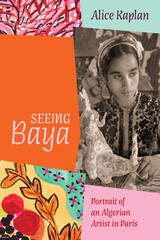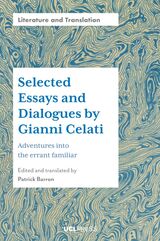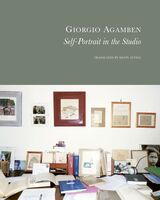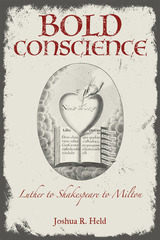
Bold Conscience chronicles the shifting conception of conscience in early modern England, as it evolved from a faculty of restraint—what Shakespeare labels “coward conscience”—to one of bold and forthright self-assertion. The concept of conscience played an important role in post-Reformation England, from clerical leaders to laymen, not least because of its central place in determining loyalties during the English Civil War and the regicide of King Charles I. Yet the most complex and lasting perspectives on conscience emerged from deliberately literary voices—William Shakespeare, John Donne, and John Milton.
Joshua Held argues that literary texts by these authors transform the idea of conscience as a private, shameful state to one of boldness fit for navigating both royal power and common dissent in the public realm. Held tracks the increasing political power of conscience from Shakespeare’s Hamlet and Henry VIII to Donne’s court sermons and Milton’s Areopagitica, showing finally that in Paradise Lost, Milton roots boldness in the inner paradise of a pure, common conscience.
Applying a fine-grain analysis to literary England from about 1601 to 1667, this study also looks back to the 1520s, to Luther’s theological foundations of the concept, and forward to 1689, to Locke’s transformation of the idea alongside the term “consciousness.” Ultimately, Held’s study shows how conscience emerges at once as a bulwark against absolute sovereignty and as a stronghold of personal certainty.
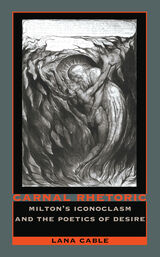
Cable traces the development of Milton’s iconoclastic poetics from its roots in the antiprelatical tracts, through the divorce tracts and Areopagitica, to its fullest dramatic representation in Eikonoklastes and Samson Agonistes. Arguing that, like every creative act, metaphor is by nature a radical and self-transgressing agent of change, she explores the site where metaphoric language and imaginative desire merge. Examining the demands Milton places on metaphor, particularly his emphasis on language as a vehicle for mortal redemption, Cable demonstrates the ways in which metaphor acts for him as that creative and radical agent of change. In the process, she reveals Milton’s engagement, at the deepest levels of linguistic creativity, with the early modern commitment to an imaginative and historic remaking of the world.
An insightful and synthetic book, Carnal Rhetoric will appeal to scholars of English literature, Milton, and the Renaissance, as well as to those with an interest in the theory of affective stylistics as it pertains to reader-response criticism, semantics, epistemology, and the philosophy and psychology of language.
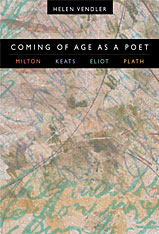
To find a personal style is, for a writer, to become adult; and to write one’s first “perfect” poem—a poem that wholly and successfully embodies that style—is to come of age as a poet. By looking at the precedents, circumstances, and artistry of the first perfect poems composed by John Milton, John Keats, T. S. Eliot, and Sylvia Plath, Coming of Age as a Poet offers rare insight into this mysterious process, and into the indispensable period of learning and experimentation that precedes such poetic achievement.
Milton’s L’Allegro, Keats’s On First Looking into Chapman’s Homer, Eliot’s The Love Song of J. Alfred Prufrock, and Plath’s The Colossus are the poems that Helen Vendler considers, exploring each as an accession to poetic confidence, mastery, and maturity. In meticulous and sympathetic readings of the poems, and with reference to earlier youthful compositions, she delineates the context and the terms of each poet’s self-discovery—and illuminates the private, intense, and ultimately heroic effort and endurance that precede the creation of any memorable poem.
With characteristic precision, authority, and grace, Vendler helps us to appreciate anew the conception and the practice of poetry, and to observe at first hand the living organism that breathes through the words of a great poem.
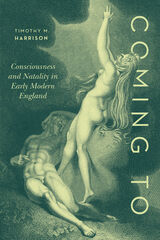
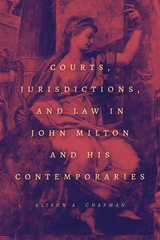
Surveying Milton’s early pamphlets, divorce tracts, late political tracts, and major prose works in comparison with the writings and cases of some of Milton’s contemporaries—including George Herbert, John Donne, Ben Jonson, and John Bunyan—Chapman reveals the variety and nuance in Milton’s juridical toolkit and his subtle use of competing legal traditions in pursuit of justice.
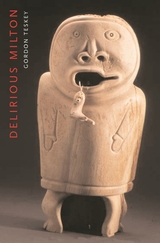
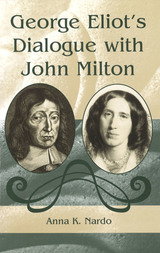
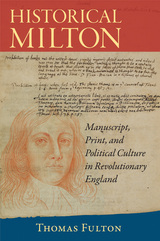
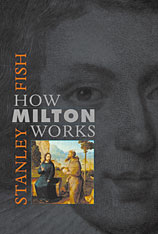
Stanley Fish's Surprised by Sin, first published in 1967, set a new standard for Milton criticism and established its author as one of the world's preeminent Milton scholars. The lifelong engagement begun in that work culminates in this book, the magnum opus of a formidable critic and the definitive statement on Milton for our time.
How Milton works "from the inside out" is the foremost concern of Fish's book, which explores the radical effect of Milton's theological convictions on his poetry and prose. For Milton the value of a poem or of any other production derives from the inner worth of its author and not from any external measure of excellence or heroism. Milton's aesthetic, says Fish, is an "aesthetic of testimony": every action, whether verbal or physical, is or should be the action of holding fast to a single saving commitment against the allure of plot, narrative, representation, signs, drama--anything that might be construed as an illegitimate supplement to divine truth. Much of the energy of Milton's writing, according to Fish, comes from the effort to maintain his faith against these temptations, temptations which in any other aesthetic would be seen as the very essence of poetic value.
Encountering the great poet on his own terms, engaging his equally distinguished admirers and detractors, this book moves a 300-year debate about the significance of Milton's verse to a new level.
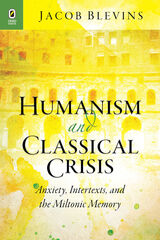
Blevins grounds his approach in the theories of Jacques Lacan, whose work challenges the very notions of what identity is and, as a result, exposes the complexities of identity formation. Areas and authors covered include imitations and translations of classical works of the sixteenth and seventeenth centuries in England and France by Andrew Marvell, Edmund Spencer, Pierre Ronsard, Joachim Du Bellay, Ben Jonson, Sir Thomas Wyatt, and John Milton.
This book not only provides a new perspective on early modern poetic imitation, but also offers a foundational methodology for examining the classical presence within the modern self.

A wide-ranging study of the ideology of population control in early modern England
Across the sixteenth and seventeenth centuries, a growing notion of the value of a large populace created a sense of urgency about reproduction; accordingly, a wide array of English writers of the time voiced the need not merely to add more people but also to ensure that England had an abundance of the right kinds of people. This need, in turn, called for a variety of institutions to train—and thus make, through a kind of nonbiological procreation—pious, enterprising, and dutiful subjects. In Increase and Multiply, David Glimp examines previously unexplored links between this emergent demographic mentality and Renaissance literature.
Glimp’s analysis centers on humanist pedagogy as a mechanism for creating people capable of governing both themselves and others. Acknowledging the ways in which authors such as Sidney, Shakespeare, and Milton advance their own work by appealing to this vision, Glimp argues that their texts allow us to read the scope and limits of this generative ideal, its capacity to reinforce order and to become excessive and destabilizing. His work provides unprecedented insight into the role of fantasies of nonbiological reproduction in early modern political theory, government practice, and literary production.
With literature waning in the interest of so many, is Shakespeare the only poet the public can still appreciate? John Milton, as this book makes clear, speaks more powerfully to the eternal questions and to the important concerns of our time. The Milton of this volume is an author for all Americans—conservative, liberal, radical—not only because he was a favorite of the founding fathers, his voice echoing through their texts and our very foundation, but also because his visionary writing embodies the aspirations that have guided Americans seeking ideals of ethical and spiritual perfection.
Nigel Smith makes a compelling case for Milton’s relevance to our present situation. In direct and accessible terms, he shows how the seventeenth-century poet, while working to write the greatest heroic poem in the English language, also managed to theorize about religious, political, and civil liberty in ways that matter as much today as they did in Puritanical times. Through concise chapters that chart Milton’s life at the center of the English and European literary and political scenes—as well as his key themes of free will, freedom and slavery, love and sexual liberty, the meaning of creation, and the nature of knowledge—Smith’s work brings Milton, his poetry, and his prose home to readers of our day. A provocative and enlightening introduction, for newcomers and informed readers alike, this book rediscovers and redefines Milton for a new generation, one that especially needs and deserves to know him.
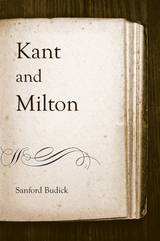
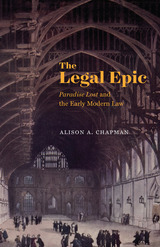
Alison A. Chapman argues that Milton’s Paradise Lost sits at the apex of the early modern period’s long fascination with law and judicial processes. Milton’s world saw law and religion as linked disciplines and thought therefore that in different ways, both law and religion should reflect the will of God. Throughout Paradise Lost, Milton invites his readers to judge actions using not only reason and conscience but also core principles of early modern jurisprudence. Law thus informs Milton’s attempt to “justify the ways of God to men” and points readers toward the types of legal justice that should prevail on earth.
Adding to the growing interest in the cultural history of law, The Legal Epic shows that England’s preeminent epic poem is also a sustained reflection on the role law plays in human society.
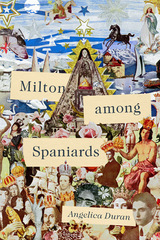
Published by University of Delaware Press. Distributed worldwide by Rutgers University Press.
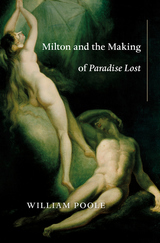
Milton and the Making of Paradise Lost tells the story of John Milton's life as England’s self-elected national poet and explains how the single greatest poem of the English language came to be written.
In early 1642 Milton—an obscure private schoolmaster—promised English readers a work of literature so great that “they should not willingly let it die.” Twenty-five years later, toward the end of 1667, the work he had pledged appeared in print: the epic poem Paradise Lost. In the interim, however, the poet had gone totally blind and had also become a controversial public figure—a man who had argued for the abolition of bishops, freedom of the press, the right to divorce, and the prerogative of a nation to depose and put to death an unsatisfactory ruler. These views had rendered him an outcast.
William Poole devotes particular attention to Milton’s personal situation: his reading and education, his ambitions and anxieties, and the way he presented himself to the world. Although always a poet first, Milton was also a theologian and civil servant, vocations that informed the composition of his masterpiece. At the emotional center of this narrative is the astounding fact that Milton lost his sight in 1652. How did a blind man compose this staggeringly complex, intensely visual work? Poole opens up the epic worlds and sweeping vistas of Milton’s masterpiece to modern readers, first by exploring Milton’s life and intellectual preoccupations and then by explaining the poem itself—its structure, content, and meaning.
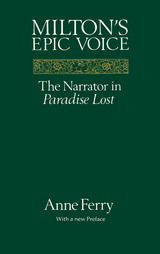
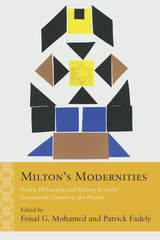
Bristling with insights on Milton’s major works, Milton’s Modernities offers fresh perspectives on the thinkers central to our theorizations of modernity: from Lucretius and Spinoza, Hegel and Kant, to Benjamin and Deleuze. At the volume's core is an embrace of the possibilities unleashed by current trends in philosophy, variously styled as the return to ethics, or metaphysics, or religion. These make all the more visible Milton’s dialogues with later modernity, dialogues that promise to generate much critical discussion in early modern studies and beyond.
Such approaches necessarily challenge many prevailing assumptions that have guided recent Milton criticism—assumptions about context and periodization, for instance. In this way, Milton’s Modernities powerfully broadens the historical archive beyond the materiality of events and things, incorporating as well intellectual currents, hybrids, and insights.
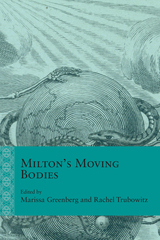
A collection of innovative examinations of embodiment in Milton’s oeuvre that challenge assumptions about disciplinary boundaries
This volume brings unprecedented focus to the forms, spaces, and implications of embodied motion in Milton’s writing and its afterlives to explore how and why he privileges the body—human and textual—as a site of dynamic movement. The contributors bring a variety of lenses to Milton’s moving bodies: political history, kinematics, mathematics, cosmology, translation, illustration, anatomies of racialized and disabled bodies, and twenty-first-century pedagogies. From these wide-ranging vantage points, they consider anew Milton’s contributions to the histories of scientific development, global exploration and imperial expansion, migration and diaspora, and translation and adaptation in England, Europe, and the Americas, from the early modern period to today. Milton’s Moving Bodies draws together established and emerging scholars, offering fresh analyses of the poet’s legacy for multiple traditions within and beyond Milton studies.
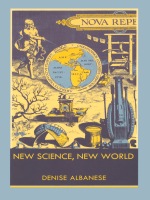
Albanese reads the inaugurators of the scientific revolution against the canonical authors of early modern literature, discussing Galileo’s Dialogue on the Two Chief World Systems and Bacon’s New Atlantis as well as Milton’s Paradise Lost and Shakespeare’s The Tempest. She examines how the newness or “novelty” of investigating nature is expressed through representations of the New World, including the native, the feminine, the body, and the heavens. “New” is therefore shown to be a double sign, referring both to the excitement associated with a knowledge oriented away from past practices, and to the oppression and domination typical of the colonialist enterprise. Exploring the connections between the New World and the New Science, and the simultaneously emerging patterns of thought and forms of writing characteristic of modernity, Albanese insists that science is at its inception a form of power-knowledge, and that the modern and postmodern division of “Two Cultures,” the literary and the scientific, has its antecedents in the early modern world.
New Science, New World makes an important contribution to feminist, new historicist, and cultural materialist debates about the extent to which the culture of seventeenth-century England is proto-modern. It will offer scholars and students from a wide range of fields a new critical model for historical practice.
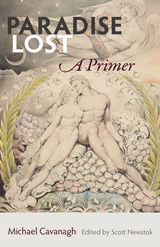

Eighteenth-century and Romantic readers had a peculiar habit of calling personified abstractions “sublime.” This has always seemed mysterious, since the same readers so often expressed a feeling that there was something wrong with turning ideas into people—or, worse, turning people into ideas. In this wide-ranging, carefully argued study, Steven Knapp explains the connection between personification and the aesthetics of the sublime.
Personifications, such as Milton’s controversial figures of Sin and Death in Paradise Lost, were seen to embody a unique combination of imaginative power and overt fictionality, and these, Knapp shows, were exactly the conflicting requirements of the sublime in general. He argues that the uneasiness readers felt toward sublime personifications was symptomatic of broader ambivalences toward archaic beliefs, political and religious violence, and poetic fiction as such.
Drawing on recent interpretations of Romanticism, allegory, and the sublime, Knapp provides important new readings of Coleridge, Wordsworth, Kant, and William Collins. His provocative thesis sheds new light on the relationship between Romanticism and the eighteenth century.
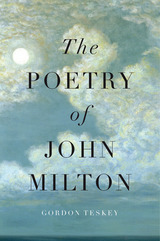
John Milton is regarded as the greatest English poet after Shakespeare. Yet for sublimity and philosophical grandeur, Milton stands almost alone in world literature. His peers are Homer, Virgil, Dante, Wordsworth, and Goethe: poets who achieve a total ethical and spiritual vision of the world. In this panoramic interpretation, the distinguished Milton scholar Gordon Teskey shows how the poet’s changing commitments are subordinated to an aesthetic that joins beauty to truth and value to ethics. The art of poetry is rediscovered by Milton as a way of thinking in the world as it is, and for the world as it can be.
Milton’s early poems include the heroic Nativity Ode; the seductive paired poems “L’Allegro” and “Il Penseroso”; the mythological pageant Comus, with its comically diabolical enchanter and its serious debate on the human use of nature; and “Lycidas,” perhaps the greatest short poem in English and a prophecy of vast human displacements in the modern world. Teskey follows Milton’s creative development in three phases, from the idealistic transcendence of the poems written in his twenties to the political engagement of the gritty, hard-hitting poems of his middle years. The third phase is that of “transcendental engagement,” in the heaven-storming epic Paradise Lost, and the great works that followed it: the intense intellectual debate Paradise Regained, and the tragedy Samson Agonistes.

"A brilliant study that quietly but powerfully recharacterizes many of the contexts of discussion in Milton criticism. Particularly noteworthy is Schwartz's ability to introduce advanced theoretical perspectives without ever taking the focus of attention away from the dynamics and problematics of Milton's poem."—Stanley Fish

Milton’s Great Poems—Paradise Lost, Paradise Regained, and Samson Agonistes—are here examined in the light of his lifelong commitment to the English revolutionary cause. The poems, Joan Bennett shows, reflect the issues Milton had dealt with in theological and public policy debate, foreign diplomacy, and propaganda; moreover, they work innovatively with these issues, reaching in epic and tragedy answers that his pamphlets and tracts of the past twenty years had only partially achieved. The central issue is the nature and possibility of human freedom, or “Christian liberty.” Related questions are the nature of human rationality, the meaning of law, of history, of individuality, of society, and—everywhere—the problem of evil.
The book offers a revisionist position in the history of ideas, arguing that Renaissance Christian humanism in England descended not from Tudor to Stuart Anglicanism but from Tudor Anglicanism to revolutionary Puritanism. Close readings are offered of texts by Richard Hooker, Milton, and a range of writers before and during the revolutionary period. Not only theological and political positions but also political actions taken by the authors are compared. Milton's poems are studied in the light of these analyses.
The concept of “radical Christian humanism” moves current Milton criticism beyond the competing conceptions of Milton as the poet of democratic liberalism and the prophet of revolutionary absolutism. Milton's radical Christian humanism was built upon pre-modern conceptions and experiences of reason that are not alien to our time. It stemmed from, and resulted in, a religious commitment to political process which his poems embody and illuminate.
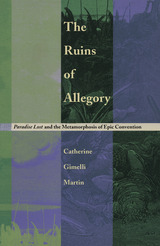
Martin shows how Paradise Lost, written at the threshold of the enormous imaginative shift that accompanied the Protestant, scientific, and political revolutions of the seventeenth century, conforms to a prophetic baroque model of allegory similar to that outlined by Walter Benjamin. As she demonstrates, Milton’s experimentation with baroque forms radically reformulates classical epic, medieval romance, and Spenserian allegory to allow for both a naturalistic, empirically responsible understanding of the universe and for an infinite and incomprehensible God. In this way, the resulting poetic world of Paradise Lost is like Milton’s God, an allegorical “ruin” in which the divine is preserved but at the price of a loss of certainty. Also, as Martin suggests, the poem affirmatively anticipates modernity by placing the chief hope of human progress in the fully self-authored subject.
Maintaining a dialogue with a critical tradition that extends from Johnson and Coleridge to the best contemporary Milton scholarship, Martin sets Paradise Lost in both the early modern and the postmodern worlds. Ruins of Allegory will greatly interest all Milton scholars, as well as students of literary criticism and early modern studies.

This reading of Milton juxtaposes the poet's theology and Freud's account of the Oedipus complex in ways that yield both new understanding of Milton and a model for psychoanalytic interpretation of literature.
The book ranges widely through the art and life of Milton, including extensive discussions of his theological irregularities and the significance, medical and symbolic, he assigned to his blindness. Kerrigan analyzes the oedipal aspect of Milton's religion; examines the nature of the Miltonic godhead; studies Milton's analogies linking human, angelic, and cosmic bodies; and explores Milton's symbolism of home. In a commanding demonstration, Kerrigan delineates how the great epic and the psyche of its author bestow meaning on each other.
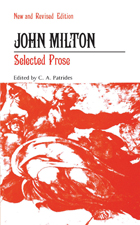
Although John Milton is best known for his poems such as Paradise Lost, his prose works, including Areopagitica, The Tenure of Kings, and The Doctrine and Discipline of Divorce, are important in their own right. In this selection of Milton’s prose, C.A. Patrides presents the best possible texts of complete works in a format designed to enable students to understand Milton the thinker as well as to judge for themselves the achievements of Milton the artist in prose.
First published in 1974, C.A. Patrides ‘s edition of Milton’s prose has proved invaluable to students and scholars of Renaissance literature because it includes mostly the complete texts of Milton’s prose works. Now, in this new and updated edition, Patrides has revised his introduction and his bibliography to reflect advances in Milton scholarship in the past ten years. In addition, the selections have been expanded to include passages from Milton’s theological treatise De doctrina Christiana.
For sale only in the USA and Philippines.

Sedley uses the juxtaposition of Montaigne and Milton to argue that two seminal early modern phenomena, the rise of the sublime as an aesthetic category and the emergence of skepticism as a philosophical problem, are interrelated. The comparison of these two Renaissance writers highlights the traditions that have canonized them and also complicates the canonical views: Sedley's perspective reveals how Montaigne cultivated his famous skepticism in order to produce sublimity, while Milton forged his renowned sublimity through his encounter with skepticism. Sedley's first argument is that sublimity motivated skepticism: the sense that a force existed outside the aesthetic categories conventional in the Renaissance drove authors into a skeptical frame of mind. His second argument is that skepticism created sublimity: the skeptical mind-set offered alternative resources of aesthetic power and enabled authors to fashion a sublime style. These claims revise standard views of skepticism and sublimity, suggesting a mandate for an enriched aesthetics behind late-Renaissance loss of belief and exposing the Renaissance impulse behind modern notions of sublimity.
"Sedley's work takes seriously our ongoing engagement with doubt. It is a brisk and brilliant guide to the disparate pathways through which early modern skepticism made its way to the sublime."
-Eileen Reeves, Associate Professor of Comparative Literature, Princeton University
"Sublimity and Skepticism in Montaigne and Milton is a powerful piece of revisionist intellectual history. By demonstrating the close links between the rise of skepticism and the power of the sublime, Sedley offers a welcome antidote to the heavily ideological tenor of much recent cultural studies. With clarity and elegance Sedley shows that two of the greatest writers of the late Renaissance, Montaigne and Milton, are haunted by a crisis of authority, which is accompanied by the irruption of the sublime, by an inchoate sense of being overwhelmed by the phenomenal world. Through deft and intelligent readings Sedley shows how key moments in the works of these two great authors are structured by the intersection of the sublime and the skeptical. This book should be of great interest to literary scholars, aestheticians, and intellectual historians working in several languages. It is a very fine piece of work."
-Tim Hampton, Professor of French, UC Berkeley
"A refreshingly modern and elegant understanding of Montaigne and Milton as inaugurating the sublime possibilities of the fragmentary and incomprehensible. Sedley reinserts these writers into a history of the transformation of admiration into awe, and makes us revisit the beginnings and the justifications of our own esthetics of the sublime."
-Ullrich Langer, Professor of French and Italian, University of Wisconsin
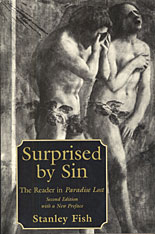
In 1967 the world of Milton studies was divided into two armed camps: one proclaiming (in the tradition of Blake and Shelley) that Milton was of the devil's party with or without knowing it, the other proclaiming (in the tradition of Addison and C. S. Lewis) that the poet's sympathies are obviously with God and the angels loyal to him.
The achievement of Stanley Fish's Surprised by Sin was to reconcile the two camps by subsuming their claims in a single overarching thesis: Paradise Lost is a poem about how its readers came to be the way they are--that is, fallen--and the poem's lesson is proven on a reader's impulse every time he or she finds a devilish action attractive or a godly action dismaying.
Fish's argument reshaped the face of Milton studies; thirty years later the issues raised in Surprised by Sin continue to set the agenda and drive debate.
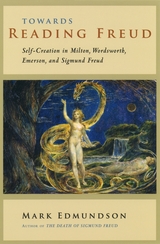
“Marvelous. . . . Edmundson’s book offers an extraordinary challenge both to practicing analysts and to a scholarly community which all too uncomplainingly inhabits and reinforces the Freudian paradigm of interpretation. Edmundson reinvents an adventurous and dissident Freud as an antidote to . . . weary psychoanalytic commonplaces.”—Malcolm Bowie, Raritan
“This book takes a distinguished place in the ongoing effort to recontextualize Freud by stressing the literary, rather than the scientific roots and character of his theory.”—Virginia Quarterly Review
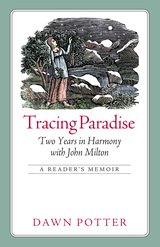
Tracing Paradise: Two Years in Harmony with John Milton is her memoir of that long task. Over the course of twelve chapters, Potter explores her very personal response to Milton and Paradise Lost, tracing the surprising intersections between a seventeenth-century biblical epic and the routine joys and tragedies of domestic life in contemporary rural Maine. Curious, opinionated, and eager, she engages with the canon on mutable, individual terms. Though she writes perceptively about the details and techniques of Milton's art, always her reactions are linked to her present-tense experiences as a poet, small-time farmer, family member, and citizen of a poor and beleaguered north-country town.
A skilled and entertaining writer, Potter is also a wide-ranging and sophisticated reader. Yet her memoir is not a scholarly treatise: her enthusiasms and misgivings about both Milton and Paradise Lost ebb and flow with the days. Tracing Paradise reminds us that close engagement with another artist's task may itself be a form of creation. Above all, Potter's memoir celebrates one reader's difficult yet transformative love affair with Milton's glorious, irritating, inscrutable masterpiece.
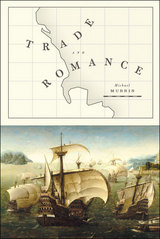
READERS
Browse our collection.
PUBLISHERS
See BiblioVault's publisher services.
STUDENT SERVICES
Files for college accessibility offices.
UChicago Accessibility Resources
home | accessibility | search | about | contact us
BiblioVault ® 2001 - 2024
The University of Chicago Press


